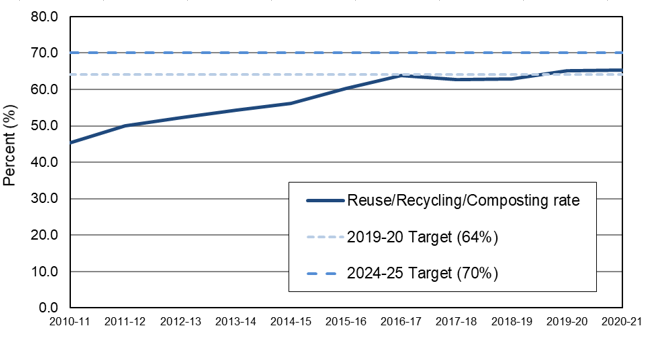
New stats show Wales upholds world class recycling rates, despite pandemic
Ystadegau newydd yn dangos bod Cymru yn cynnal cyfraddau ailgylchu o safon byd, er gwaetha’r pandemig
Wales – currently ranked third in the world in recycling- upheld its stellar recycling rates last year despite the pandemic, new 2020-21 stats have revealed today.
Nationally the recycling rate was 65.4% with eighteen of 22 local authorities exceeding the statutory minimum target of 64%, and 13 reporting an increase in performance on the previous year. Exceptionally the next statutory minimum target of 70% by 2024-2025, was already achieved by Pembrokeshire, Ceredigion, Conwy and Vale of Glamorgan.
What’s more, in the spirit of ‘reduce, reuse, then recycle’ – where reducing waste ranks the priority goal- the amount of rubbish ending up in landfill for 2020-21 dropped to less than 5%. This is good news for Welsh Government’s bold circular economy plans, which outlines an ambitious target to achieve zero waste in Wales by 2050.
A reduction in business operations during the pandemic, including the closure of hospitality and offices, is believed to be the driver behind the lower overall waste figures. An increase in household waste also reflects this, as more people spent time at home.
Why are these stats important? In order to tackle the climate and nature emergency, moving to a circular economy – where materials are kept in use and waste is avoided - is essential. Our consumption and associated waste is a key contributor to the emissions heating our planet, the decline in biodiversity and is also detrimental to public health. A move to a circular economy will not only kick our single use habit and decrease our emissions, but it will build supply chain resilience as reused materials stay in Wales and substitute our reliance on raw materials from overseas.
The high rate of household recycling in Wales saves over 400,000 tonnes of CO2 per year from being released into the atmosphere and is a key contribution to tackling climate change.
Wales has long been a stand-out performer in the UK when it comes to recycling rates. The Welsh Government’s £1billion investment since devolution in household recycling has helped see its rates catapult from just 4.8% in 1998-1999, to over 65% in 2020-21. According to the latest global study from Eunomia (2017), Wales is ranked third in the world behind Germany and Taiwan on the global recycling leaderboard.
Minister for Climate Change Julie James said:
“Our recycling stats are world class thanks to a Team Wales effort. They show what we can achieve when government, business and the third sector work together towards a common goal.
“They also show that while investment and partnership working have been key ingredients of this success, ultimately this achievement has been down to people recycling at home in every part of Wales. Our move to a circular economy is good for helping our homegrown businesses flourish, while helping us decarbonise, reduce waste and support our recovery from the pandemic.
“As well as already having made a significant difference to our emissions, our excellent recycling track record is a fantastic platform for us to build on in tackling the climate and nature emergencies, so we can pass on a resilient, green and prosperous Wales to our future generations. ”
Notes to editors
- These stats relate to local authority collected municipal waste and can be seen here
- Welsh Government’s ‘Beyond Recycling’ strategy can be found here: Wales aims to become world number one recycler as it announces Circular Economy strategy | GOV.WALES
- 2019-2020 was the first year the 64% target was introduced, up from the previous 58% target which had been in place since 2015-16.
- Our next statutory target is to reach a 70% minimum recycling rate by 2024-2025 and we have committed to work with Local Authorities and other key partners to develop new statutory recycling targets beyond 70% in line with our ambition to reach zero waste and 100% recycling by 2050
- 47 million tonnes of local authority municipal waste were generated in 2020-21, a decrease of 2.6 per cent on 2019-20
- Landfill rate now only 4.9 per cent in 2020-21, beating the 2025 target of <5%
- Keeping resources in use and avoiding waste is a key part of the transition to a circular economy.
- Recycling helps keep high-quality materials in our economy and strengthens supply chains.
- Shorter supply chains, and realising the value in our resources, are key to our efforts to decarbonise, reduce waste and support our recovery from the pandemic.
